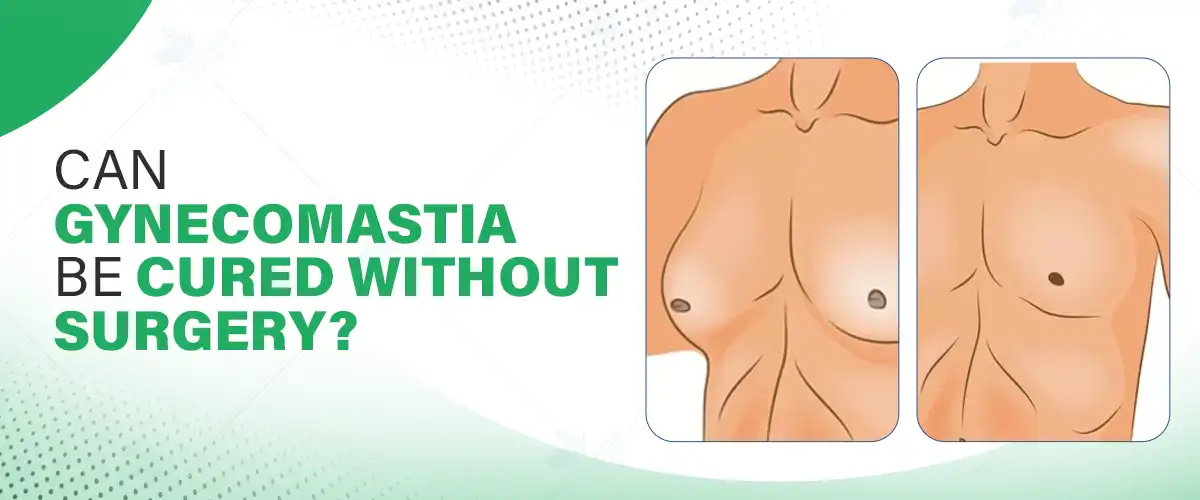
Subscribe to our

Gynecomastia, commonly known as enlarged male breast tissue, is a condition that affects many men, leading to discomfort and self-consciousness. It occurs due to an imbalance between estrogen and testosterone levels, often influenced by factors such as obesity, medications, or underlying health conditions. While gynecomastia treatment without surgery is possible in many cases, some severe instances may require surgical intervention.
For those seeking treatment in India, Felix Hospital is known as the best plastic surgery hospital offering expert care and treatment options for gynecomastia. But before considering surgery, let's explore non-surgical treatment options and whether they can effectively cure gynecomastia.
Discover the best gynecomastia treatment without surgery. Schedule a consultation now by Calling +91 9667064100.
To determine the best gynecomastia treatment without surgery, it is crucial to understand its root causes:
1. Hormonal Imbalance
Hormonal fluctuations, particularly an increase in estrogen or a decrease in testosterone, can lead to gynecomastia. These imbalances can occur naturally during puberty or due to aging.
2. Medications
Certain medications, such as anabolic steroids, anti-androgens, antidepressants, and some heart and ulcer drugs, may contribute to gynecomastia by altering hormone levels.
3. Obesity
Excess fat, especially around the chest area, can mimic gynecomastia, known as pseudo-gynecomastia. Fat accumulation can also lead to increased estrogen production, worsening the condition.
4. Medical Conditions
Underlying health issues like liver disease, kidney failure, thyroid disorders, and tumors can disrupt hormone balance, leading to gynecomastia.
Many cases of gynecomastia can be managed through non-surgical means. Here are the most effective gynecomastia treatment without surgery options:
1. Dietary Changes
2. Exercise Routine
3. Stress Management
In some cases, medications can be an effective gynecomastia treatment without surgery.
1. Hormone Therapy
Compression garments offer a temporary, non-invasive solution to conceal gynecomastia, boosting confidence while undergoing non-surgical treatment.
While gynecomastia treatment without surgery is effective for many, certain cases require surgical intervention:
In such cases, consulting a skilled plastic surgeon is advisable to explore surgical options like liposuction or gland removal.
Felix Hospital in Noida is home to some of the best plastic surgeons specializing in gynecomastia treatment. If surgery becomes necessary, Dr. Pragya Priya and Dr. Vishvendu Gaur are the top specialists providing expert care and personalized treatment plans.
Dr. Pragya Priya is a renowned plastic and reconstructive surgeon with expertise in treating gynecomastia using advanced surgical techniques. She is known for her precision and a patient-centric approach, ensuring minimal scarring and fast recovery.
Dr. Vishvendu Gaur is another esteemed plastic surgeon at Felix Hospital, specializing in body contouring and gynecomastia surgery. His extensive experience and dedication make him a trusted choice for patients seeking the best results.
For those looking for gynecomastia treatment without surgery, these specialists also offer personalized non-surgical treatment plans, ensuring patients receive the most effective solution.
Get expert consultation today and Book an appointment with the best plastic surgeons at Felix Hospital.
Gynecomastia can often be treated without surgery through lifestyle changes, medication, and natural remedies. However, in severe or persistent cases, surgery might be the best solution. Early intervention and consultation with a specialist increase the chances of successful treatment.
If you’re seeking the best plastic surgery hospital for gynecomastia treatment, Felix Hospital in Noida offers expert care with Dr. Pragya Priya and Dr. Vishvendu Gaur, ensuring safe and effective results. Consult a specialist today to determine the best approach for your condition.
1. Can gynecomastia go away on its own without treatment?
Ans: Mild cases of gynecomastia, especially those caused by puberty, may resolve on their own within a few months to a couple of years. However, persistent cases may require lifestyle changes, medication, or surgical intervention.
2. What foods should I avoid to prevent gynecomastia from worsening?
Ans: Avoid processed foods, sugary beverages, alcohol, and soy-based products, as they can contribute to hormonal imbalances and increased estrogen levels, worsening gynecomastia.
3. How effective are workouts in reducing gynecomastia?
Ans: Targeted chest exercises and overall fat loss can help reduce pseudo-gynecomastia (fat accumulation in the chest). However, true gynecomastia caused by glandular growth may not respond significantly to exercise alone.
4. Are there any medications that can completely reverse gynecomastia?
Ans: Medications like Tamoxifen, Raloxifene, and Aromatase Inhibitors can help reduce breast tissue growth in some cases, but they may not work for everyone. Consulting a doctor is essential before starting any medication.
5. Is gynecomastia linked to serious health problems?
Ans: While gynecomastia itself is not life-threatening, it can be a symptom of underlying conditions such as liver disease, thyroid disorders, or hormonal imbalances that need medical attention.
6. How do I know if I have true gynecomastia or just excess chest fat?
Ans: True gynecomastia is characterized by firm or rubbery glandular tissue under the nipple, while pseudo-gynecomastia is soft and mainly composed of fat. A medical examination or ultrasound can confirm the diagnosis.
7. When should I consider surgery for gynecomastia?
Ans: Surgery is recommended when gynecomastia persists despite lifestyle changes and medication, causes psychological distress, or results in hardened breast tissue that won’t shrink naturally.